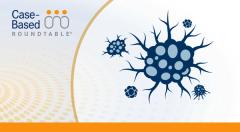
Transfusion Independence Sustained With Imetelstat in Low-Risk MDS
Mikkael A. Sekeres MD, MS, discusses transfusion independence rates with imetelstat in patients with low- to intermediate-1 risk myelodysplastic syndromes.
Episodes in this series

Mikkael A. Sekeres MD, MS, professor of medicine and chief of the Division of Hematology, Leukemia Section at the University of Miami Health System, Sylvester Comprehensive Cancer Center, discusses transfusion independence rates with imetelstat (Rytelo) in patients with low- to intermediate-1 risk myelodysplastic syndromes (MDS).
On the phase 3 IMerge trial (NCT02598661), 118 patients and 60 patients were randomly assigned to imetelstat vs placebo, respectively. This double-blind trial, patients had to be erythropoiesis-stimulating agent relapsed, refractory, or ineligible and transfusion dependent.
Transcription:
0:10 | On this study, the 8-week transfusion independence rate was 40% for those who received imetelstat vs 15% for those who received placebo.... When you're looking at an 8-week duration of transfusion independence, you can get these false response rates to placebo in a lower-risk MDS population. So when we looked at 16-week duration of transfusion independence, which is how we've defined what we think should be a more clinically meaningful duration of transfusion independence in the 2018 revision to the International Working Group response criteria, the response rate to imetelstat was still 31% compared [with] only 7% in those patients who received placebo.
0:58 | One aspect of the response that I liked in the IMerge trial of imetelstat vs placebo was that the transfusion independence response rate seemed to hold pretty well even when you extended the duration of transfusion independence response from 8 weeks to 16 weeks. At 24 weeks, so almost 6 months of transfusion independence, it was still 28% in those patients who received imetelstat vs 3% in those patients who received placebo. So it continued to hold over time. When you look at the median duration of response, it was almost exactly 1 year in those patients who received imetelstat. So to summarize, what I would say is about one-third of patients receiving imetelstat had a transfusion independence response for a duration that we think is clinically meaningful, and the median duration of that response was also meaningful at approximately 1 year.























